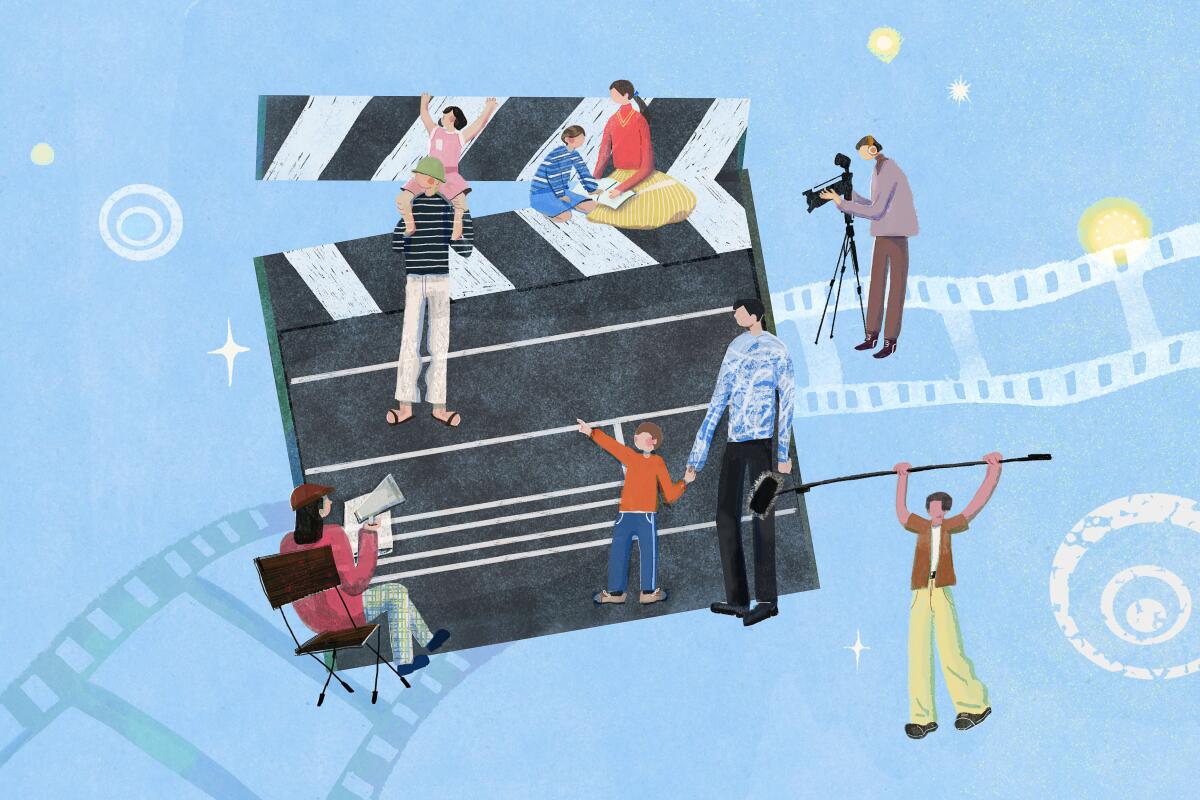These filmmakers delight in keeping things all in the family

- Share via
When Lee Isaac Chung walked onto the set of his new movie, “Minari” — a “highly fictionalized” look at his life growing up in a trailer home on a farm in Arkansas — he had to take a moment. Though he’d given his production designer Yong Ok Lee photos of his childhood home, he wasn’t prepared for how the re-creation took him back.
“She managed to make that place almost identical to how we had it,” he says. “The first day, I was in a daze. I opened the back door and was expecting to see our farm. It was crazy. She taught me a lesson, though: She said, ‘This is not your house, and this is not your family.’ It had almost slipped my mind.”
Family life, and family members, have a surprising way of infiltrating personal film projects. Several scripts this awards season use personal histories, or direct family connections, to tell their stories: Along with “Minari,” Florian Zeller’s “The Father” uses family history; whereas Edoardo Ponti directs his mother, Sophia Loren, in “The Life Ahead,” and brothers Anthony and Joe Russo directed “Cherry,” which was cowritten by their sister Angela Russo-Otstot. In addition, David Fincher’s “Mank” is based on a script his late father Jack wrote.
But however the family connection gets made, those who’ve done it say using that intimate connection to make a movie is a real boon, in more ways than one.
“We come from a large Italian family,” says Joe Russo. “To have people you intrinsically trust and have decades of shorthand with has made all of our work better. Two minds are exponentially better than one.”
Or, in their case, three. Russo-Otstot has been a part of her brothers’ projects since their earliest days, moving up from preparing food for the crew, to being an actress, a producer and now coscreenwriter. She’s also the president of creative for the Russos’ production company AGBO.
“We challenge each other in ways we might not be able to challenge others,” she says. “There’s constant interaction — you’re able to call your sibling at midnight when you have an idea.”
Mother and son Loren and Ponti have been working together on and off since he was a preteen — Ponti co-starred with her in an Italian TV movie from 1984, “Qualcosa di biondo.” Directing her on “Life Ahead,” he says, was made easier, because, like the Russos, they have a strong, intimate connection.
“I know when she reaches her most authentic truth,” he says. “I just have to hold my mother’s hand or look at her, and she knows exactly what I want. And I know exactly what she feels when she touches my hand. And neither of us uses the mother-son relationship to get something out of the other person.”
“The atmosphere when we make a picture is wonderful,” agrees Loren. “It’s really like being in church. The only thing we think about is what we have to do, and do it well.”
When family isn’t actually on the set but on the page, screenwriters and directors have to navigate some tricky angles to get their stores told. On the one hand, a script that stems from a personal place has more emotional heft, but fictionalization is critical to give it narrative resonance, which means that what ends up on the screen in front of millions is a potent blend of utterly real and utterly invented.
“I was raised by my grandmother, and she started to suffer from dementia when I was 15, so I was directly concerned with this issue,” says Zeller, whose “The Father” focuses on a man beginning to lose his grip on reality. It’s adapted from his stage play of the same name (he has similar biographically based plays, “The Son” and “The Mother”). “I was driven by those memories. But this was not about telling my story — there’s not enough to make a film. It’s about giving [audiences] the feeling that it was their experience.”
Still, once a film is based on a rejiggered part of history, there’s at least one other hurdle to overcome: Just what does the family think about it?
“My position is to try and hurt no one,” Zeller says of his plays and film. “I wouldn’t have done it if it wasn’t with the blessing of the people involved. My position is not to add pain to people I care for.”
Chung was equally cautious. “I had a lot of fear doing it, particularly with what my parents would think,” he says. “I didn’t want them to be offended. In a strange way, though, it made me understand my parents a little better.”
And when he showed “Minari” to his parents, that new comprehension shone through. “They watched it and were so moved,” he says. “Our relationship had a breakthrough after we watched it together. They felt I had seen into their story in a way they hadn’t been seen in the past.”
And in the end, no matter what a filmmaker may say, bringing family into the mix usually has one big benefit: Parents do love it when their kids play nice together.
“They love it,” Russo says of his parents’ reaction to the trio of siblings working as a Hollywood team. “It really is a family business.”
More to Read
From the Oscars to the Emmys.
Get the Envelope newsletter for exclusive awards season coverage, behind-the-scenes stories from the Envelope podcast and columnist Glenn Whipp’s must-read analysis.
You may occasionally receive promotional content from the Los Angeles Times.







